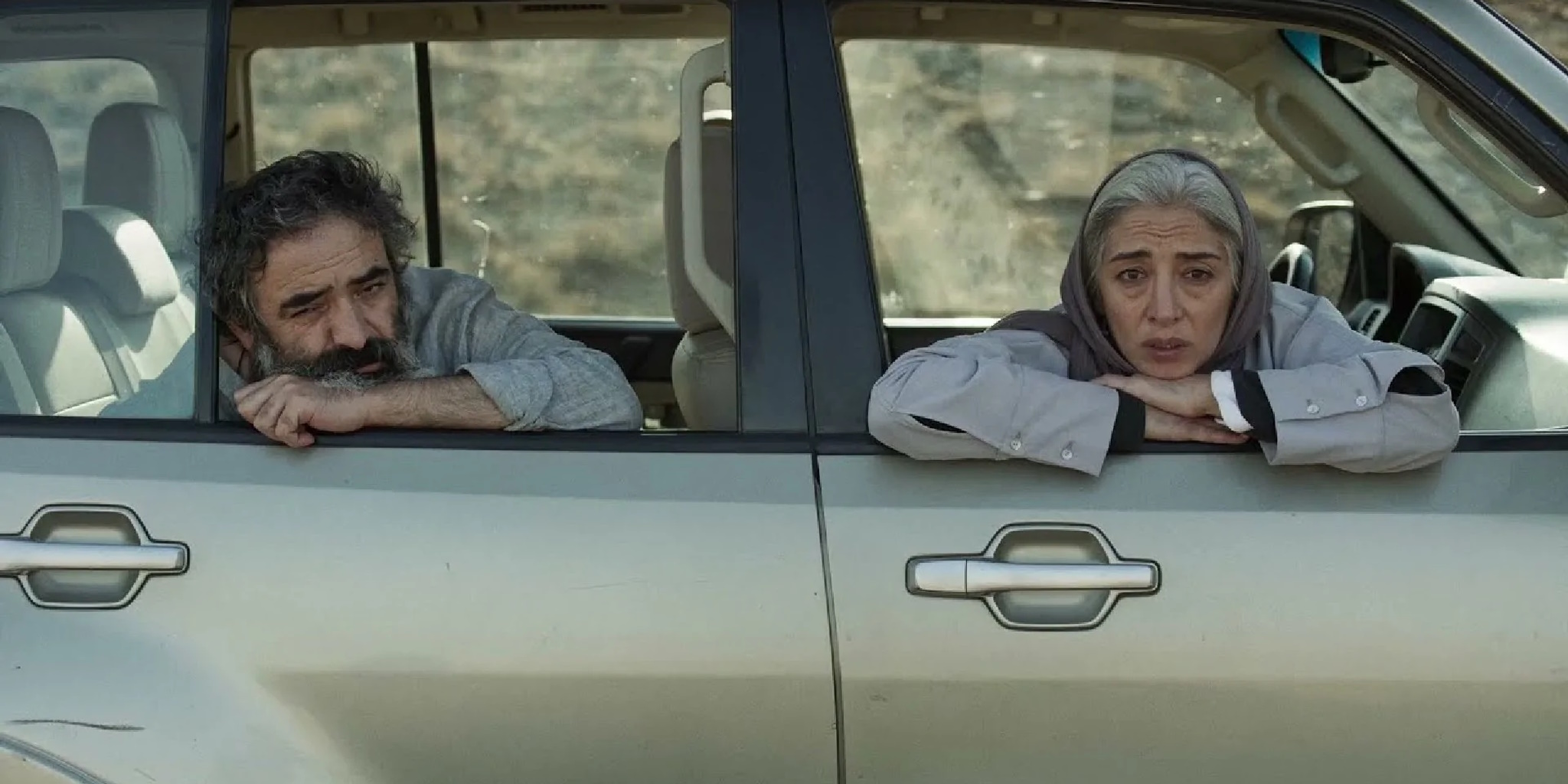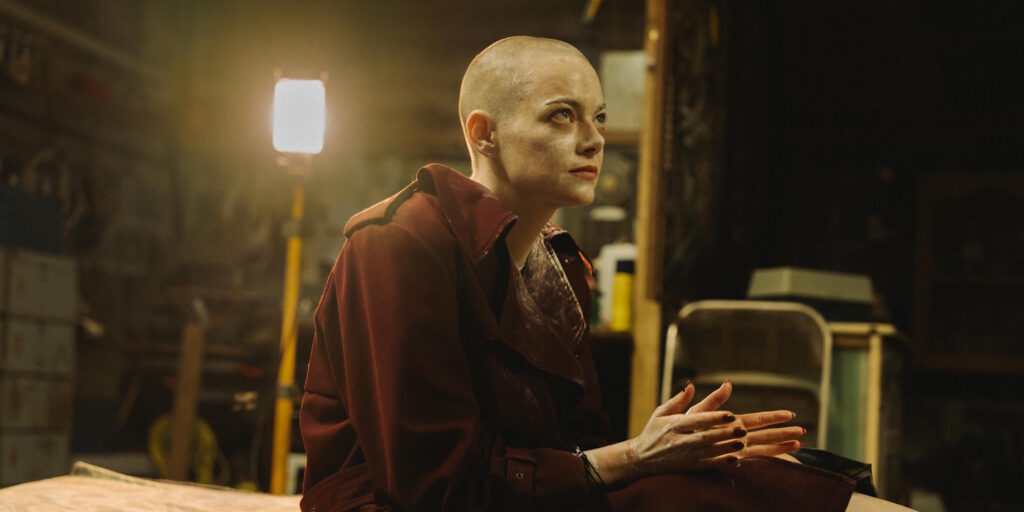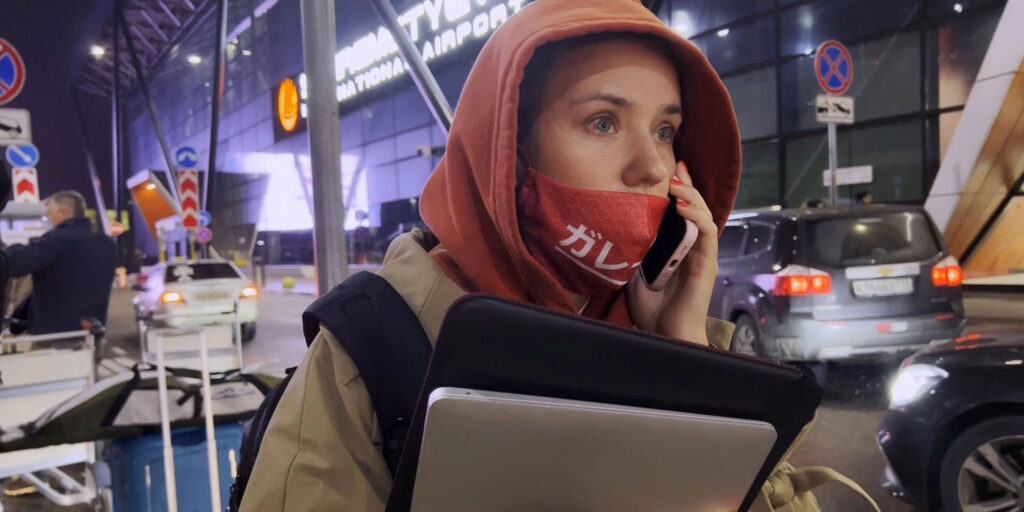[Originally published at Cinema St. Louis’ The Lens.]
Like many great road movies, Panah Panahi’s quirky, bittersweet directorial debut, Hit the Road, is a story about people who are stuck. This is true in the literal sense: The characters comprise an unnamed family of four who are traversing the backroads of northwestern Iran’s scenic Armenian ridgelands in a dusty SUV. As anyone who has been crammed into a vehicle with their relations for an extended period can attest, such close quarters provide an unfortunately opportune stage for anxieties and resentments to come trickling out. For Panahi’s characters, even the pit stops along the way foster a sensation of entrapment. The family isn’t lost exactly – their destination is clear, even if their route is hazy – but they spend an inordinate amount of time idling restively on the side of the road, waiting for hapless locals who will point them in the right direction.
One senses that Mom (Pantea Panahiha) and Dad (Hasan Majuni) are perhaps taking things slow because they still feel deeply ambivalent about this abrupt road trip. Panahi’s shrewdly laconic screenplay takes its time in revealing the rationale behind the clan’s ad hoc odyssey, although straightaway there is a palpable tension in the air that goes beyond familial baggage. The wriggly, outspoken Little Brother (Rayan Sarlak) might be largely oblivious, but Mom, Dad, and Big Brother (Amin Simiar) are visibly wary of any passing authorities, and they choose their words carefully when speaking with strangers. This guardedness is warranted, as the family has made arrangements for Big Brother to meet with some smugglers and flee across the border into Turkey.
The film never clarifies the reason why the adult son fears looming persecution by the state – it is variously implied to be due to his politics, his sexuality, or both – yet that ambiguity hardly matters. Hit the Road has the otherworldly sheen of an existential fable, even if the stakes are grounded in real-world Iranian politics. There is, to be sure, a not-so-subtle critique of the Islamic Republic in the film, which looks askance at any autocratic policy that would compel a family to fracture itself in such a way. Indeed, it would be remarkable if the son of acclaimed dissident filmmaker Jafar Panahi (Offside, This Is Not a Film, Taxi) had directed a feature without at least some sharply political subtext.
However, Hit the Road reveals a second-generation filmmaker who has burst from the starting gate with his own voice fully developed. The artistic relationship between parent and child here resembles that of David and Brandon Cronenberg: The cinematic influence of the father is readily apparent, but the son has nonetheless carved out a distinctive, captivating vision. The younger Panahi amplifies the droller, absurdist aspects seen in the elder’s Three Faces (2018), turning what could have been a white-knuckle tale of political exile into a languid, slightly surreal dramedy. Hit the Road has its moments of perilous tension, but it is foremost a story about this eccentric, close-knit little family and the farcical tragedy of being hemmed in by choices that aren’t really choices at all. Unquestionably, Mom and Dad are going to do whatever it takes to protect their oldest son’s freedom, and, naturally, their hearts are still going to shatter into a million pieces when the time comes to say goodbye.
Mom is the clear-eyed realist in the family, and one intuits that the scheme to smuggle Big Brother across the border was driven by her urgent maternal protectiveness. Yet she is also the more emotive and sentimental parent, chain-smoking through her angry tears and surreptitiously snipping a lock of dark hair from the head of her dozing oldest son. Hobbling around on crutches due to a recently broken leg, Dad plays the part of the passive-aggressive grump, although it’s plain that his obdurate, dyspeptic demeanor is hardly a recent development. There is obviously unresolved friction between Dad and Big Brother, the latter having inherited both his mother’s sensitivity and his father’s stubbornness. Resentful at his forced exile, he takes out his frustration on his parents, stewing in the driver’s seat about the monumental unfairness of his situation. Little Brother, meanwhile, is the untroubled wild card, a precocious, pint-sized agent of chaos who combines the best (and worst) traits of Gene and Louise Belcher. Kept in the dark about the real reason for the road trip, he dotes on the half-dead stray dog that the family has recently adopted, annoying Dad to no end.
To the extent that Hit the Road has a plot, it concerns the family finding their way to a vaguely described waystation in the Armenian highlands, where Big Brother will rendezvous with the smugglers and hopefully cross the border on foot. Panahi mostly plays the logistics of this endeavor for bone-dry comedy, while leavening the journey with a digressive yet resonant encounter here and there. One memorably odd (and uncomfortably trenchant) sequence involves the family’s literal run-in with a competitive cyclist, who has no compunctions about accepting a ride that will give him an illicit advantage over his race-mates.
In general, however, such episodic events are secondary to Panahi’s interest in the four primary characters and their relationships with one another. The halting nature of the journey – peppered with stops, delays, and hurry-up-and-wait downtime – provides ample opportunity for the camera to follow the family members individually and in rotating pairs. In this way, the filmmaker fleshes out their fraught but ultimately loving dynamic and reveals the frustrations that unite them. In its essence, Hit the Road is a story that evokes the awful, sick-joke sensation of being trapped by circumstances beyond your control, cornered into making Hobson’s choices that you never contemplated. It’s about that feeling of self-centered, directionless anger that flares up when a sudden swerve upends the neat and tidy narrative of your life, a universal experience that Panahi conveys with the sweet specificity of all great humanist storytellers.
To most American viewers, Hit the Road’s blend of wry humor and earnest pathos will likely strike a familiar indie-dramedy chord. However, Panahi presents these components with a surreal half-twist of existential absurdity that gives his film a unique, invigorating flavor. When Mom, waking from a nap and blinking blearily at their surroundings asks, “Where are we?,” Little Brother pipes up cheerfully and matter-of-factly, “We’re dead.” A morbid joke, perhaps, but it contains a ring of truth to characters who often feel like they are lost souls hurtling down some Plutonic highway to nowhere. Panahi also adds a dose of twinkling magical realism in the final act, but this gesture doesn’t really add or subtract much from the dominant tone of the film: a thrilling fusion of family drama, charming comedy, and philosophical dolefulness. The feature’s irresistible soundtrack of vintage Persian pop tunes – which often thrillingly blur the line between diegetic and non-diegetic – is just the sweet lemon syrup drizzled on one of the year’s best and most original films.
Hit the Road is now available to rent or purchase on major online platforms.




